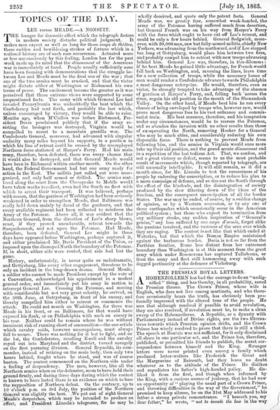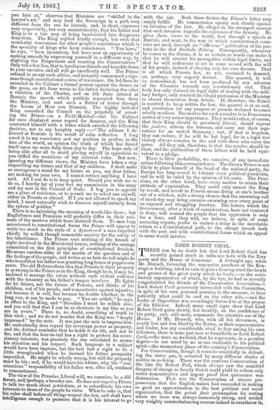THE PRUSSIAN ROYAL LETTERS.
AHOHENZOLLERN has had the courage to do an "undig- nified" thing, and has thereby, in all probability, saved the Prussian throne. The Crown Prince, whose wife is English, who does not live among martinets, and who there- fore occasionally hears the truth, has obviously been pro- foundly impressed with the altered tone of the people. He sees that although resolved if possible to avoid revolution, they are also resolved, if revolution must be, to make a clean sweep of the Hohenzollerns. A Republic, or a dynasty with Parliamentary instead of Divine rights, are the two alterna- tives towards which Prussian opinion drifts, and the Crown Prince has wisely resolved to prove that there is still a third. The speech at Dantzic was not sufficient, for it only disclaimed all share in one particular act, and the Prince has, therefore, published, or permitted his friends to publish, the secret cor- respondence between himself and the King. Stranger letters were never printed even among a family which produced letter-writers like Frederick the Great and the Margravine of Baireuth, but they leave no doubt whatever as to the attitude of the Prince. He dislikes and repudiates his father's high-handed policy. He dis- liked it from the first, and though when informed by the King, with a curious nuance of jealousy, that he had now an opportunity of "playing the usual part of a Crown Prince, and throwing difficulties in the way of the Government," he promised to keep silence, he on the 31st May addressed to his father a strong private remonstrance. "I beseech you, my dear father," he wrote, "not to invade the law in the way you hint at," observes that Ministers are "skilled in the lawyer's art," and may lead the Sovereign in a path very different from the one he intends, and, in short, expresses very respectfully, but very unmistakeably, that his father and King is in a fair way of being bamboozled into dangerous despotism. The King replied kindly enough, but with that wonderful irreverence for other people's convictions which is the specialty of kings who keep consciences. "You have," he says, "been incautious, but have now an opportunity of making amends by expressing yourself in a different way, by slighting the Progressists and courting the Conservatives. Only tell a few lies, that is, insultyour friends and knuckle down to your enemies, and all will go excellently well. The Prince refused to accept such advice, and instantly commenced a vigo- rous though constitutional course of resistance. On 3rd June he recorded in the Cabinet a formal protest against the decree on the press, on 4th June wrote to his father declaring the edict a violation of the Charter' and on 5th June uttered at Dantzic the speech which publicly separated him from the Ministry, and sent such a flutter of terror through the bosom of Herr von Bismark. The highly irritated King consulted the Council on the propriety of arrest- ing the Prince—as a Field-Marshal—but the Cabinet for once displayed some regard for decency, and the King contented himself with a letter which extorted the following decisive, not to say haughty reply :—" The address I de- livered at Dantzic is the result of calm reflection. I long owed it to my conscience and my position to profess, in the face of the world, an opinion the truth of which has forced itself upon me more fully from day to day. The hope only of being able after all to avoid placing myself in opposition to you stifled the monitions of my internal voice. But now, ignoring my different views, the Ministry have taken a step imperilling my future and that of my children. I shall make as courageous a stand for my future as you, my dear father, are makineb for your own. I cannot retract anything I have said. AllI can do is to keep quiet. Should you wish me to do so, I hereby lay at your feet my commission in the army and my seat in the Council of State. I beg you to appoint me a place of residence, or to permit me to select one myself, either in Prussia or abroad. If I am not allowed to speak my mind, I must naturally wish to dissever myself entirely from the sphere of politics. There is no mistaking the meaning of words like these ; but Englishmen and Prussians will probably differ in their esti- mate of the motives which have dictated them. To men long accustomed to constitutional forms the Prince will appear to write too much in the style of a dynast—of a man impelled chiefly by selfish though reasonable anxiety for the safety of his inheritance. The Prince says nothing of the breach of right involved in the Ministerial course, nothing of the outrage committed on the first principles of constitutional freedom. He seems careless alike of the merits of the question and of the feelings of the people, and writes as an heir-in-tail might do who heardthat his fatherwas granting long leases at peppercorn rents. The old Hohenzollern idea that Prussia is their property is as strong in the Prince as in the King, though he is, it may be, inclined to manage the estate without such violent collision with the tenantry as his father's temper involves. He fights for his future, not the future of Prussia, and thinks of his children, not of his people, and remonstrates against injustice, not because it is evil, but because he doubts whether, in the long run it can be made to pay. "You are selfish," he says, in effect the King, and "therefore I must be selfish also ; and you will find that I can be as obstinate in my line as you are in yours." There is, no doubt, something of truth in this view ; and we do not wonder that the King was "deeply impressed" by the note. It was just the note to impress him. He undoubtedly does regard his sovereign power as property, and the distinct reminder that he holds it for life, and not in fee, and that the heir-in-tail has a right to protect his rever- sionary interests, was precisely the one calculated to secure his attention and his respect. Such language in a subject would have been impious, but the heir had a right to be a little wrongheaded when he deemed his future prosperity imperilled. He might be wholly wrong, but still the property must be his ; and, if he would have his whims why the " con- scientious " responsibility of his father was, after all, confined to remonstrance.
The view of the Prussian Liberal will, we conceive, be a dif- ferent, and,iperhaps, a broader one. He does not expect a Prince to talk too much about patriotism, or to subordinate his own interests to those of the people lie rates. What lie asks is, that his ruler shall before all things respect the law, and shall have intelligence enough to perceive that it is his interest to go with the age. Both these desires the Prince's letter very amply fulfils. He remonstrates openly and clearly against an invasion of the law. He alleges in the strongest manner that such invasion imperils the existence of the dynasty. Ho gives these views to the world, first through a speech at Dantzic, and next, in the way to which constitutional coun- tries are used, through an " officious " publication of his pro- tests in the Sad Deutsche Zeitung. Consequently, whenever he comes to the throne, it is as certain as words can make it that lie will restrict his prerogative within legal limits, and that lie will endeavour to act in some accord with the will of his people, instead of obeying only his own dreams. That is all which Prussia has, as yet, ventured to demand, or, perhaps, very eagerly desires. The quarrel, it will be remembered, has not been produced by any advance of the Chamber towards any revolutionary end. That body has only claimed its legal right of dealing with the mili- tary budget, only resisted the illegal pretension of the Ministry to absent themselves from debate. If, therefore, the Prince is resolved to keep within the law, the quarrel is at an end, and revolution for any purpose at present declared becomes wholly needless. The motive for such a resolve is to Prussiaus a matter of very minor importance. They would rather, of course, that their King should be genuinely liberal, should repress the junkers, reform the bureaus, and carry out their aspi- rations for an united Germany ; but, if that is hopeless, they can endure, if he will be but legal, for in a legal war victory always remains in the end with those who carry the purse. All they ask, therefore, is that the resolve should be clear, and the publication of these letters will be held equi- valent to a pledge.
There is little probability, we conceive, of any immediate action following this correspondence. The Crown Prince is not likely to place himself at the head of the national party, for Europe has long ceased to tolerate even political parricides, and he will be ruled by the opinion of his caste. The Prus- sians, on the other hand, have every motive to retain their attitude of expectation. They could only unseat the King by revolt, and revolt in Prussia means firing at one's brother out of a window, with a strong chance that the answering roll of musketry may bring enemies swarming over every point of an exposed and straggling frontier. The letters, which the Government, after a week of consideration, have not ventured to deny, will remind the people that the oppression is only for a time, and they will, we believe, in spite of some menacing reports, prefer to endure a delay in the inevitable return to a Constitutional path, to the abrupt breach both with the past and with constitutional forms which an appeal to arms would involve.































 Previous page
Previous page